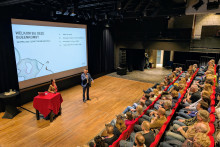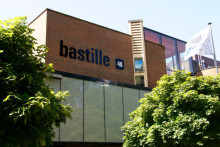Konrad began his talk with a quick memory demo where he successfully managed to memorize a deck of shuffled cards in an astonishing minute and thirty-four seconds.
No born genius
Konrad is often met with the opinion that he is just born with amazing memorizing abilities, which he says is far from the truth. ‘I learned to do it during my final exams at school, when I realized that last-minute studying didn’t really work at all. Then I heard somewhere that there were techniques to do this, and I was intrigued!’ Driven by this curiosity, Konrad decided, after having had two master’s degrees in Physics and Computer Science, to switch gears to a PhD in Neuroscience.
Memory basics
‘If you split memory up simplistically into a chain, memory consists of at least encoding at the beginning – where information gets into the brain – and recall at the end of the chain, which is retrieving information when asked. What most people do not focus on, is the consolidation step that happens in between.’ The consolidation of information happens at night while sleeping, where the memory reorganizes itself, also leading to loss of information. This is why Konrad thinks that it is natural to forget information.
Memory palace
According to Konrad, we are restricted by the brain’s limited working memory capacity. Memory techniques allow information to reach the long-term memory instead. Konrad prefers to summarize his memory techniques in the form of a so-called ‘memory palace’. ‘The memory or the roof of the palace is supported by the walls which are the memory techniques and a foundation at the bottom which is visual thinking. This shows that the foundation of all memory techniques is visual thinking.’
Method of loci, digits, and names
To demonstrate his first technique – the method of loci, Konrad involved the audience in an interactive session. The students were asked to link different body parts to a group of words in the form of a visual story. An example of this was linking the words ‘moss’ and ‘cow’ with feet. A majority was able to successfully memorize the set of words, only to later realize that they had actually memorized a list of 10 cities. The group of words could be linked to a city – ‘moss’ and ‘cow’ with ‘Moscow’. Similar techniques could be used to memorize digits and names as well.
Reviewing vs recalling
Konrad claims that repeating memory techniques ‘make the memory connections more optimal’ and improve memory performance over time. He explained this by highlighting the results of several research studies. According to Konrad, repeating is done effectively through retrieval rather than reviewal of information as one might expect. This is what he refers to as the ‘testing effect’, where individuals review or intake less information and instead retrieve the information they learned through taking tests. This leads to long term retention of information. His takeaway message to students: ‘Retrieving is important. After you’re done with your class, take a minute or two to ask yourself what the class was about. This will trigger your brain to mark it as important and this information will be consolidated to be stored in long term memory.’







